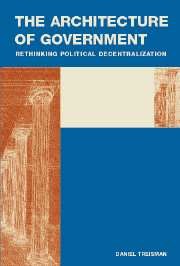Book contents
- Frontmatter
- Contents
- List of Figures and Tables
- Preface
- Glossary of Main Notation Used
- 1 INTRODUCTION
- 2 THE POLITICAL PROCESS
- 3 ADMINISTRATIVE EFFICIENCY
- 4 COMPETITION AMONG GOVERNMENTS
- 5 FISCAL POLICY AND REDISTRIBUTION
- 6 FISCAL COORDINATION AND INCENTIVES
- 7 CITIZENS AND GOVERNMENT
- 8 CHECKS, BALANCES, AND FREEDOM
- 9 ACQUIRING AND USING KNOWLEDGE
- 10 ETHNIC CONFLICT AND SECESSION
- 11 DATA TO THE RESCUE?
- 12 CONCLUSION: RETHINKING DECENTRALIZATION
- References
- Index
- Titles in the series
5 - FISCAL POLICY AND REDISTRIBUTION
Published online by Cambridge University Press: 05 June 2012
- Frontmatter
- Contents
- List of Figures and Tables
- Preface
- Glossary of Main Notation Used
- 1 INTRODUCTION
- 2 THE POLITICAL PROCESS
- 3 ADMINISTRATIVE EFFICIENCY
- 4 COMPETITION AMONG GOVERNMENTS
- 5 FISCAL POLICY AND REDISTRIBUTION
- 6 FISCAL COORDINATION AND INCENTIVES
- 7 CITIZENS AND GOVERNMENT
- 8 CHECKS, BALANCES, AND FREEDOM
- 9 ACQUIRING AND USING KNOWLEDGE
- 10 ETHNIC CONFLICT AND SECESSION
- 11 DATA TO THE RESCUE?
- 12 CONCLUSION: RETHINKING DECENTRALIZATION
- References
- Index
- Titles in the series
Summary
Does decentralization … make it more difficult to adjust fiscal accounts once a structural deficit has developed? The experience of many countries suggests that under the circumstances often found in developing countries subnational governments are likely to contribute – sometimes significantly – to the aggravation of macroeconomic problems.
Vito Tanzi (1996, p. 305)[C]ontrary to a common misconception, decentralized fiscal systems offer a greater potential for improved macroeconomic governance and regional fiscal equity than centralized fiscal systems. While empirical evidence on these questions is quite weak, nevertheless it further supports the conclusion that fiscal decentralization is associated with improved fiscal performance and better functioning of the internal common market. This is to be expected as decentralized fiscal systems require greater clarity in the roles of various players (centers of decision making), transparency in rules and greater care in the design of institutions that govern interactions to ensure fair play and limit opportunities for rent seeking.
Anwar Shah (2005, p. 3)Governments take money from some and give it to others. They impose taxes that fall more heavily on certain individuals and corporations, and they use the revenues to provide public goods, services, and cash transfers that benefit other groups. Some types of redistribution discriminate among citizens based on where they live or work – “geographical redistribution”; others use ascriptive, economic, or social criteria – “intergroup redistribution.” Most governments use both types. Officials may redistribute for many reasons, including commitments to social justice.
- Type
- Chapter
- Information
- The Architecture of GovernmentRethinking Political Decentralization, pp. 104 - 136Publisher: Cambridge University PressPrint publication year: 2007

